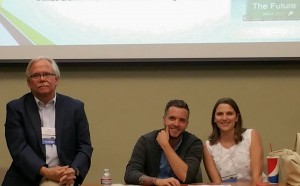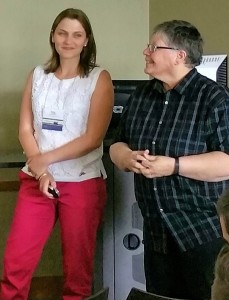Written By: Mitch R
A couple weeks ago, two StepUP alumni Joey J. and Gabe S., along with StepUP Director Patrice Salmeri and StepUP Assistant Director Scott Washburn, departed from Minnesota to head to Reno, Nevada to attend the 6th National Collegiate Recovery Conference. It became a site where established and emerging Collegiate Recovery Communities and Programs (CRP) staff and students gathered to educate and learn, connect and relate, and to share stories of their victories and of their struggles.
In her welcome address to the conference attendees, Patrice Salmeri, the President of the Association of Recovery in Higher Education stated, “No one should have to choose between recovery and a college degree.” This was the premise of the conference and everything that occurred during the three days.
Gabe, in cohort with Scott Washburn, aided Mr. Washburn in presenting his research “CRP Alumni perspectives on Life and Recovery after College”, for his dissertation which involves studying students transitioning from collegiate recovery back into the “real world.” Not to say that what we go through as students isn’t “real” per se, but there is definitely something to be said about the safety net felt by all while in college. Especially for recovering students, at a place like StepUP, if the desire is there, it is a relatively easy place to stay sober. This perspective of gratitude for such a healthy environment was not lost on Gabe, and led him to reflect throughout the trip on how far StepUP has come in relation to other institutions. “As Augsburg students we have a building for us and staff there for us…This conference called things into perspective about how good we have it at StepUP.” 
A highpoint came on the trip when Washburn, Gabe and Joey had the opportunity to pick the brains of a couple of professionals who have risen to the top of their field within addiction studies, drug prevention and drug treatment: David K. Mineta, the Deputy Director of Demand Reduction with the Office of National Drug Control Policy, Executive Office of the President, and Kevin McCauley, the co-founder of the Institute of Addiction Studies. According to Gabe, they spent their time, “chatting about drug policy, being young and sober and talking to them about ideas, asking for insight.” It was refreshing for him, considering that the conversation didn’t feel as though these respected professionals were talking to them as students but rather as colleagues. This speaks to the event as a whole with Gabe remarking, “Everybody we met was there to help. There wasn’t much ego involved.”
That wasn’t the only time spent connecting with others about the joys and pitfalls of being sober in college. Joey commented on other highpoints for those who went which included spending time talking and walking with students from around the country discussing what their experiences are like, “I gained the most from talking with CRC Staff members about how to better programs and ways in which to promote academic success with students.” In an environment like that, it was easy for those involved to get vulnerable and to talk openly and honestly about their programs and search for ways in which we can all improve. 
This conference, of course, was filled with realizations for all, reminding everyone of the work that collegiate recovery programs face. Most of all, regarding the transition from collegiate life into the “real world”, is the battle with stigma. This fact of very present stigma surrounding addiction led one presenter to remark that, “We can’t have shame.” Students from these programs must have the right to enter into the world with the pride that the work done in these programs wasn’t for naught. That students can hold their heads high and know that the experience has changed their outlook for the better. We all have a right to a college experience, and for Gabe’s part, this seemed a main mission of the conference, “Battling stigma, believing that we get to be normal people.” He continues on to remark that the experience, “Renewed my gratitude for collegiate recovery and I walked away with a new sense of duty to make this an option for anybody who wants it.”

